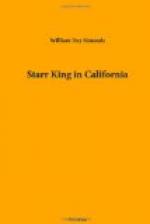It is no part of our purpose to give in detail the strange story of California during her first ten years as an American Commonwealth. By 1850 her population had increased to 120,000 people, mostly young men drawn by the lure of gold from every quarter of the civilized world, including not less than 4000 Chinese. Yet the majority were Americans, and of the Americans the larger number were from the slave states. Nor was this condition much altered up to the outbreak of the Civil War. Trustworthy authorities estimate that not less than forty per cent of her entire population were at that time of Southern birth, naturally Democratic in politics and for the most part pro-slavery in sentiment. It should be remembered that during the decade under consideration the national government was under the brilliant leadership of the slave-masters who were ever alert as to the attitude of this new Eldorado of the West. Consequently every position of trust and honor under national control in California was given to “safe men” whose attitude towards the “peculiar institution” was favorable beyond suspicion. To such an extent was this a matter of public knowledge that the Customs Station of San Francisco was popularly dubbed the “Virginia Poor House.” During all these years California was under the absolute control of the Democratic Party, and the party was under control of its Pro-slavery leaders.
“The common people,” says a late historian, “stood in awe for many years of these suave, urbane, occasionally fire-eating and always well-dressed gentlemen from this most aristocratic section of the Union. The Southerners, born leaders of men, and with politics the paramount interest in their lives, controlled both San Francisco and California.”
J. W. Forney, a politician and reporter of the time, is more emphatic and declares that “California was a secession rendezvous from the day it became a part of the Union.”
That the State was strongly Southern in sympathy is proven by the fact that of fifty-three newspapers published within her borders only seven advocated the election of Lincoln to the Presidency in 1860. A stronger proof still is found in the character and conduct of the public men of California during all the period under consideration. With one or two exceptions, of whom honorable mention later, every official of any importance, state or national, favored the South and voted in her interest. This condition was partly due, without doubt, to the political leadership of Senator Wm. M. Gwin. A Tennessean by birth, he was forty-six years of age, when he landed in San Francisco, June 4, 1849. Almost immediately active in politics he became the most brilliant and unscrupulous leader California has ever had. He held the reins of power and of national patronage until the war brought chaos to the old order and always Wm. M. Gwin was a faithful servant of the old aristocratic South of John C. Calhoun. He was ably seconded in his efforts




